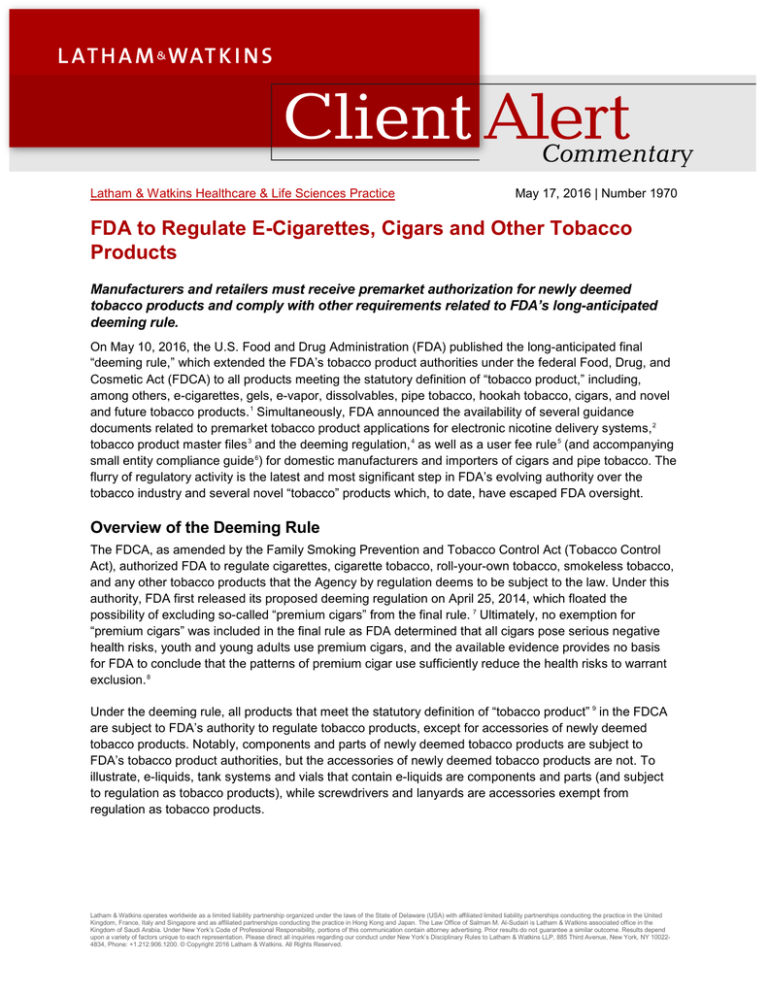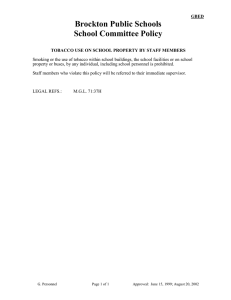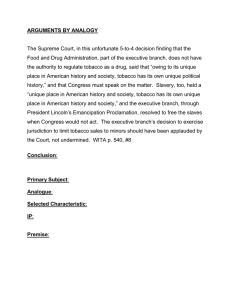
Latham & Watkins Healthcare & Life Sciences Practice
May 17, 2016 | Number 1970
FDA to Regulate E-Cigarettes, Cigars and Other Tobacco
Products
Manufacturers and retailers must receive premarket authorization for newly deemed
tobacco products and comply with other requirements related to FDA’s long-anticipated
deeming rule.
On May 10, 2016, the U.S. Food and Drug Administration (FDA) published the long-anticipated final
“deeming rule,” which extended the FDA’s tobacco product authorities under the federal Food, Drug, and
Cosmetic Act (FDCA) to all products meeting the statutory definition of “tobacco product,” including,
among others, e-cigarettes, gels, e-vapor, dissolvables, pipe tobacco, hookah tobacco, cigars, and novel
and future tobacco products. 1 Simultaneously, FDA announced the availability of several guidance
documents related to premarket tobacco product applications for electronic nicotine delivery systems, 2
tobacco product master files 3 and the deeming regulation, 4 as well as a user fee rule 5 (and accompanying
small entity compliance guide 6) for domestic manufacturers and importers of cigars and pipe tobacco. The
flurry of regulatory activity is the latest and most significant step in FDA’s evolving authority over the
tobacco industry and several novel “tobacco” products which, to date, have escaped FDA oversight.
Overview of the Deeming Rule
The FDCA, as amended by the Family Smoking Prevention and Tobacco Control Act (Tobacco Control
Act), authorized FDA to regulate cigarettes, cigarette tobacco, roll-your-own tobacco, smokeless tobacco,
and any other tobacco products that the Agency by regulation deems to be subject to the law. Under this
authority, FDA first released its proposed deeming regulation on April 25, 2014, which floated the
possibility of excluding so-called “premium cigars” from the final rule. 7 Ultimately, no exemption for
“premium cigars” was included in the final rule as FDA determined that all cigars pose serious negative
health risks, youth and young adults use premium cigars, and the available evidence provides no basis
for FDA to conclude that the patterns of premium cigar use sufficiently reduce the health risks to warrant
exclusion. 8
Under the deeming rule, all products that meet the statutory definition of “tobacco product” 9 in the FDCA
are subject to FDA’s authority to regulate tobacco products, except for accessories of newly deemed
tobacco products. Notably, components and parts of newly deemed tobacco products are subject to
FDA’s tobacco product authorities, but the accessories of newly deemed tobacco products are not. To
illustrate, e-liquids, tank systems and vials that contain e-liquids are components and parts (and subject
to regulation as tobacco products), while screwdrivers and lanyards are accessories exempt from
regulation as tobacco products.
Latham & Watkins operates worldwide as a limited liability partnership organized under the laws of the State of Delaware (USA) with affiliated limited liability partnerships conducting the practice in the United
Kingdom, France, Italy and Singapore and as affiliated partnerships conducting the practice in Hong Kong and Japan. The Law Office of Salman M. Al-Sudairi is Latham & Watkins associated office in the
Kingdom of Saudi Arabia. Under New York’s Code of Professional Responsibility, portions of this communication contain attorney advertising. Prior results do not guarantee a similar outcome. Results depend
upon a variety of factors unique to each representation. Please direct all inquiries regarding our conduct under New York’s Disciplinary Rules to Latham & Watkins LLP, 885 Third Avenue, New York, NY 100224834, Phone: +1.212.906.1200. © Copyright 2016 Latham & Watkins. All Rights Reserved.
Product Category
Components and Parts
Accessories
Table 1: Examples of Distinction Between Components and Parts and Accessories
Electronic
Nicotine Delivery
Systems (ENDS)
(including ecigarettes) 10
E-liquids; atomizers; batteries; cartomizers (atomizer plus
replaceable fluid-filled cartridge); digital display/lights to adjust
settings; clearomisers; tank systems; flavors; vials that contain
e-liquids; programmable software; coils; wires; screws; silica.
Screwdrivers
and lanyards.
Waterpipe
Tobacco 11
Pipes; flavor enhancers and the vials in which they are
contained; hose cooling attachments; water filtration base
additives (including those which are flavored); flavored hookah
charcoals and the wrappers or boxes that contain the charcoals;
bowls; valves; hoses; and heads.
Hookah glow
balls; foil pokers;
shisha oyster
forks; tongs; and
bags.
Once the regulation is effective, deemed products will be subject to the same FDCA provisions that
govern currently regulated products (e.g., cigarettes), such as the prohibitions against adulteration or
misbranding tobacco products, as well as the prohibition on unauthorized use of modified risk descriptors
(e.g., “light,” “low” and “mild” descriptors) and claims. The final rule also subjects deemed products to
FDA’s requirements governing ingredient and product listing, reporting harmful and potentially harmful
constituents (HPHCs), establishment registration, premarket review and compliance with any applicable
tobacco product standard.
In addition to the FDCA provisions that apply automatically to the deemed products, FDA also has
authority to place “restrictions on the sale and distribution of a tobacco product” if FDA determines the
restrictions are appropriate for the protection of the public health. Thus, the final deeming rule subjects
the deemed products to additional sale and distribution requirements, including minimum purchase age
and identification; mandatory display of health warning statements on product packages and
advertisements; prohibitions on vending machine sales (except in adults-only facilities); and distribution of
free samples. According to FDA, these additional restrictions are necessary in light of the impact of
nicotine on youth and young adults; the health risks of the deemed products; consumer confusion; and
misinformation about certain deemed products.
Premarket Review and Authorization Requirements
Deemed products are subject to the same premarket review provisions of Sections 905(j) and 910 of the
FDCA that govern currently regulated tobacco products, meaning that manufacturers of newly deemed
products will be required to obtain premarket authorization through one of three premarket pathways: SE
Exemption Requests; SE Reports; or Premarket Tobacco Product Applications (PTMAs). In the final rule,
FDA reiterated its previously articulated position that FDA lacks authority to change the “grandfather date”
from February 15, 2007, as the date is specified by statute. Because most e-cigarette and vapor products
were commercially marketed after the grandfather date, the deeming rule effectively mandates that these
products will be subject to the PMTA review process. That said, in the final rule, FDA identified “a nonflavored e-cigarette (also marketed as an ‘e-cigar’) that may have been on the market on February 15,
Latham & Watkins
May 17, 2016 | Number 1970 | Page 2
2007,” and observed that “this product may possibly be able to serve as an appropriate predicate for
purposes of the SE pathway.” 12
Under the deeming rule, manufacturers of all newly deemed tobacco products will have a 12, 18 or 24month initial compliance period in which to prepare applications for marketing authorization, as well as a
12-month continued compliance period after those dates in which to obtain FDA authorization (resulting in
a total compliance period of 24, 30 or 36 months during which FDA does not intend to take enforcement
action for failing to have premarket authorization). After the continued compliance period ends, new
tobacco products on the market without authorization will be subject to FDA enforcement. Importantly, the
aforementioned compliance policy applies only to products that are commercially marketed as of the
effective date of the deeming rule (i.e., August 8, 2016): any new tobacco product not on the market as of
the effective date is not covered by the compliance policy and is subject to enforcement if marketed
without premarket authorization. 13
Premarket
authorization
Initial compliance period for
manufacturers to submit (and
FDA to receive) premarket filing
Continued compliance period
for receipt of premarket
authorization
Total compliance period
Table 2: Compliance Period for Newly Deemed Tobacco Products (Marketed as of Aug. 8, 2016)
SE Exemption
Requests
12 months (Aug. 8, 2017)
12 months (Aug. 8, 2017)
24 months (Aug. 8, 2018)
SE Reports
18 months (Feb. 8, 2018)
12 months (Aug. 8, 2017)
30 months (Feb. 8, 2019)
PMTAs
24 months (Aug. 8, 2018)
12 months (Aug. 8, 2017)
36 months (Aug. 8, 2019)
Tobacco Retailers
Certain aspects of the deeming regulation will be of particular interest to retailers. For example, the
deeming regulation renders all cigarettes, smokeless tobacco and covered tobacco products in a retailer’s
establishment subject to the same age and identification requirements (18 years, as verified by photo ID,
but there is no requirement to verify the age of a person older than 26 years). In addition, the final rule
prohibits vending machine sales of newly deemed products, unless the vending machine is located in a
facility where the retailer ensures that individuals under 18 years of age are prohibited from entering at
any time. Finally, the deeming regulation includes retailer exceptions limiting liability for the sale or
distribution of non-compliant packaging that (i) contains a health warning; (ii) the manufacturer, importer
or distributor supplied to the retailer; and (iii) the retailer has not altered in a material way. 14
Vape Shops Acting as Manufacturers
Under the final rule, establishments that mix or prepare e-liquids or create or modify aerosolizing
apparatuses for direct sale to consumers for use in electronic nicotine delivery system (ENDS) products
are tobacco product manufacturers under the FDCA and, accordingly, are subject to the same legal
requirements that apply to other tobacco product manufacturers. 15 As such, under the rule, the tobacco
products that vape shops mix and/or prepare are new tobacco products within the meaning of section
Latham & Watkins
May 17, 2016 | Number 1970 | Page 3
910(a)(1) of the FDCA. Vape shops acting as manufacturers are therefore required to obtain premarket
authorization for each non-grandfathered product (i.e., e-liquid) they prepare for sale or distribution to
consumers, subject to the compliance policy outlined above.
Flavored Products
Flavored tobacco products are subject to the premarket authorization requirements applicable to other
deemed tobacco products. In the final rule, FDA expressed concern that some tobacco products, such as
e-cigarettes and cigars, are being marketed with characterizing flavors, and that these flavors can be
especially attractive to youth, potentially placing youth at risk of tobacco-related disease and death.
However, the final rule also acknowledged the “emerging evidence that some adults may potentially use
certain flavored tobacco products to transition away from combusted tobacco use.” 16 Although the
deeming regulation does not ban flavored tobacco products, the final rule does announce that FDA
intends to issue a proposed product standard that would “eliminate characterizing flavors in all cigars
including cigarillos and little cigars.” 17
Small-Scale Tobacco Product Manufacturers
Under the final rule, “small-scale tobacco product manufacturers” — manufacturers of any regulated
tobacco product that employ 150 or fewer full-time equivalent employees with annual total revenues of
US$5 million or less — are provided with additional time to comply with certain provisions of the rule (i.e.,
additional time to respond to SE deficiency letters, an additional six-month compliance period for the
tobacco health document submission requirements and additional time to submit ingredient listings). 18
Implications of the Deeming Rule
As a practical matter, manufacturers of newly deemed tobacco products will likely scramble to market
new tobacco products in advance of August 8, 2016 — the effective date of the deeming regulation — to
ensure that they receive the benefit of FDA’s premarket authorization compliance policy. Even so, absent
legislation moving the grandfather date, the deeming rule will impose severe burdens on manufacturers
and retailers of ENDS products. Indeed, the final rule acknowledges that imposing the regulatory regime
“inevitably will lead to some market change and consolidation.” 19 In light of the pending regulatory
changes, it is incumbent on industry to consider the implications of the new requirements and the means
to ensure compliance with evolving FDA regulation.
Latham & Watkins
May 17, 2016 | Number 1970 | Page 4
If you have questions about this Client Alert, please contact one of the authors listed below or the Latham
lawyer with whom you normally consult:
John R. Manthei
john.manthei@lw.com
+1.202.637.2211
Washington, D.C.
J. Benneville (Ben) Haas
ben.haas@lw.com
+1.202.637.1084
Washington, D.C.
Adam M. Susser
adam.susser@lw.com
+1.202.537.2239
Washington, D.C.
You Might Also Be Interested In
AseraCare Ruling: FCA Is Not For Differing Medical Opinions
Amarin Settles Off-Label Promotion Case Against the FDA
Perspective on Ground-Breaking Settlement Between Pacira and the FDA
Life Sciences Industry Grapples With Increasing FCPA Enforcement Activity
Client Alert is published by Latham & Watkins as a news reporting service to clients and other friends.
The information contained in this publication should not be construed as legal advice. Should further
analysis or explanation of the subject matter be required, please contact the lawyer with whom you
normally consult. The invitation to contact is not a solicitation for legal work under the laws of any
jurisdiction in which Latham lawyers are not authorized to practice. A complete list of Latham’s Client
Alerts can be found at www.lw.com. If you wish to update your contact details or customize the
information you receive from Latham & Watkins, visit http://events.lw.com/reaction/subscriptionpage.html
to subscribe to the firm’s global client mailings program.
Endnotes
1
Deeming Tobacco Products To Be Subject to the Federal Food, Drug, and Cosmetic Act, as Amended by the Family Smoking
Prevention and Tobacco Control Act; Restrictions on the Sale and Distribution of Tobacco Products and Required Warning
Statements for Tobacco Products, 81 Fed. Reg. 28974 (to be codified in 21 CFR Part 1100, 1140, and 1143) [Deeming Rule].
2
FDA, Draft Guidance for Industry: Premarket Tobacco Product Applications for Electronic Nicotine Delivery Systems (May
2016), available at, http://www.fda.gov/downloads/TobaccoProducts/Labeling/RulesRegulationsGuidance/UCM499352.pdf.
3
FDA, Guidance for Industry: Tobacco Product Master Files (May 2016), available at,
http://www.fda.gov/downloads/TobaccoProducts/Labeling/RulesRegulationsGuidance/UCM499350.pdf.
4
FDA, Small Entity Compliance Guide: FDA Deems Certain Tobacco Products Subject to FDA Authority, Sales and Distribution
Restrictions, and Health Warning Requirement’s for Packages and Advertisements (May 2016), available at,
http://www.fda.gov/TobaccoProducts/Labeling/RulesRegulationsGuidance/ucm499355.htm.
5
Requirements for the Submission of Data Needed To Calculate User Fees for Domestic Manufacturers and Importers of Cigars
and Pipe Tobacco, 81 Fed. Reg. 28707 (May 10, 2016) (to be codified at 21 CFR Part 1150).
6
FDA, Small Entity Compliance Guide: Requirements for the Submission of Data Needed to Calculate User Fees for Domestic
Manufacturers and Importers of Tobacco Products (May 2016), available at,
http://www.fda.gov/TobaccoProducts/Labeling/RulesRegulationsGuidance/ucm499355.htm.
Latham & Watkins
May 17, 2016 | Number 1970 | Page 5
7
Deeming Tobacco Products To Be Subject to the Federal Food, Drug, and Cosmetic Act, as Amended by the Family Smoking
Prevention and Tobacco Control Act; Regulations on the Sale and Distribution of Tobacco Products and Required Warning
Statements for Tobacco Products, 79 Fed. Reg. 23142 (proposed Apr. 25, 2014) (to be codified in 21 CFR Part 1100, 1140, and
1143).
8
Deeming Rule, 81 Fed. Reg. 28974, 29020 (May 10, 2016).
9
21 U.S.C. § 321(rr)(1).
10
Deeming Rule, 81 Fed. Reg. 28974, 29016 (May 10, 2016).
11
Id.
12
Id., at 28991.
13
FDA, Small Entity Compliance Guide: FDA Deems Certain Tobacco Products Subject to FDA Authority, Sales and Distribution
Restrictions, and Health Warning Requirement’s for Packages and Advertisements (May 2016), at 17, available at,
http://www.fda.gov/TobaccoProducts/Labeling/RulesRegulationsGuidance/ucm499355.htm.
14
Deeming Rule, 81 Fed. Reg. 28974, 29060 (May 10, 2016).
15
Id., at 28979.
16
Id., at 28977.
17
Id., at 29024.
18
Id , at 29026.
19
Id., at 29044.
Latham & Watkins
May 17, 2016 | Number 1970 | Page 6


